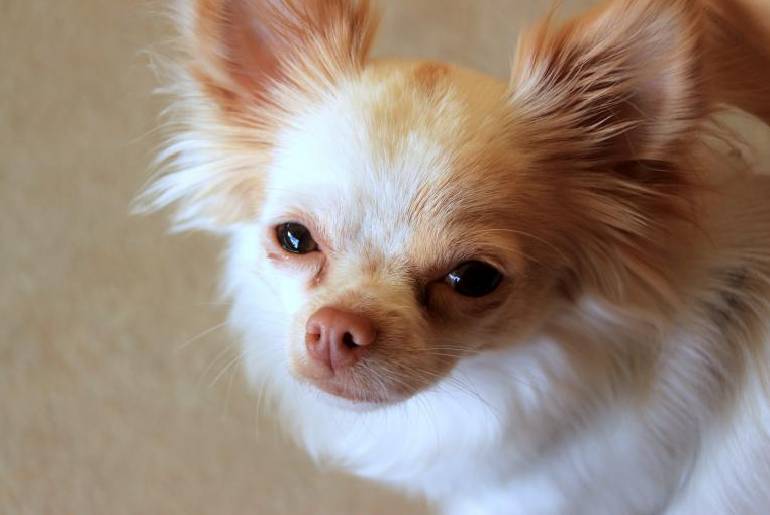When you first bring your new Chihuahua puppy home, it might seem like it will grow forever. But that’s not always the case! This article explores all the factors that affect how big a chihuahua will get and its adult size. We also provide a growth chart for those who want to know exactly how big your pup should be at any given time! How To Help Chihuahua Attain Its Full Size?
Many people know that chihuahuas are very small dogs. You might even call them toy dogs. The average weight of a 12-inch chihuahua is 4 pounds, which means they weigh about as much as one can of soup! However, you can do a few things to help your Chihuahua attain its full size and adulthood, such as food, exercise, and advice from a vet.
What Should I Do if My Chihuahua Puppy is Underweight?
If your chihuahua puppy weighs less than the ideal weight for the Chihuahua breed and age range on the dog growth chart, it means he isn’t getting enough food!
Try feeding him more often – every three hours during the day and twice at night should do it. It can also help to give him high-calorie, nutrient-dense treats between meals to help him gain weight.
How to Use the Growth Chart
If you want a more precise idea of how big your Chihuahua will grow as an adult, using a Chihuahua growth chart is very helpful!
This one from Animal Planet has been designed specifically for small breeds like chis and Shih Tzus – but it can still be used by owners of larger dogs too.
All you have to do is find where on the chart your pup’s age matches up with their sex (for example: if they are four months old, then look at the row marked ‘Males’ in column C). Then follow that row straight across until you reach their ideal weight range for full adulthood.
Chihuahua Puppy Growth: What to Expect
Using the growth chart above, you can easily determine how big your Chihuahua pup will grow. For example, if they are currently four months old and weigh two pounds, their full adult weight should be around five or six pounds!
It’s important to keep in mind that this is just a rough estimate – every dog grows at its own rate, so don’t worry too much about it.
The most important thing is simply giving them enough food during their first year to ensure they get all the nutrients they need for healthy development.
Why Do I Need To Know My Pup’s Adult Size?
Knowing how big your chihuahua puppy may grow as an adult is helpful for many reasons.
First, it can help you choose the right type and size of dog kennel or carrier as they age. You’ll also need to know their adult size if you’re considering getting them a harness – too small of a harness will be uncomfortable, and too large will be ineffective!
Another reason to figure out your pup’s adult weight is so you can start preparing mentally and financially for when that day comes.
Owning a large breed dog definitely has its perks, but some added responsibilities (like feeding them more than once a day!) come with owning a big dog.
How Big Will My Chihuahua Get?
The final question on everyone’s mind is how big exactly their Chihuahua will get.
As mentioned above, a number of factors go into the size of your Chihuahua will be when they reach adulthood.
Assuming you have raised them in an environment where they have access to enough food and nutrients for proper growth, here are some rough estimates for what your dog may weigh as an adult based on age:
| Birth weight (one day old) | 2.5 ounces | 3 ounces | 3.5 ounces | 4 ounces | 4.5 ounces | 5 ounces | 5.5 ounces |
| one week | 3.75 | 5 | 5.5 | 6.5 | 8 | 9 | 9.5 |
| two weeks | 5 | 6.5 | 7 | 9 | 11 | 12.5 | 13.5 |
| Three weeks | 6 | 8 | 9 | 11 | 14 | 16 | 17.5 |
| Four weeks | 7 | 9.5 | 11 | 13 | 17 | 19.5 | 21 |
| Five weeks | 8 | 11 | 13 | 15 | 19.5 | 22 | 24 |
| Six weeks | 9 | 12.5 | 15 | 17.5 | 22 | 24 | 27 |
| Seven weeks | 10 | 14.5 | 17 | 19.5 | 24.5 | 27 | 30 |
| Eight weeks | 11 | 16 | 19 | 21.5 | 27 | 29 | 33 |
| Nine weeks | 12 | 17.5 | 20 | 23 | 29 | 32 | 35 |
| Ten weeks | 13 | 19 | 22 | 25 | 31 | 34 | 38 |
| Eleven weeks | 14 | 21 | 24 | 27 | 34 | 37 | 42 |
| Twelve weeks | 15 | 22 | 26 | 30 | 37 | 41 | 45 |
| Thirteen weeks | 16 | 24 | 28 | 32 | 40 | 44 | 49 |
| Fourteen weeks | 17 | 26 | 30 | 34 | 43 | 47 | 52 |
| Fifteen weeks | 19 | 28 | 32 | 37 | 46 | 51 | 56 |
| Sixteen weeks | 20 | 30 | 34 | 39 | 49 | 54 | 59 |
| Seventeen weeks | 21 | 31 | 36 | 41 | 51 | 57 | 62 |
| Eighteen weeks | 22 | 33 | 37 | 43 | 54 | 60 | 65 |
| Nineteen weeks | 23 | 34 | 39 | 44 | 56 | 62 | 67 |
| Twenty weeks | 24 | 35 | 41 | 46 | 58 | 64 | 70 |
| Full Adult Weight in Pounds | 2 pounds | 3 pounds | 3.5 pounds | 4 pounds | 5 pounds | 5.5 pounds | 6 pounds |
When Do Chihuahua Puppies Stop Growing?
The final question on everyone’s mind is when do chihuahua puppies stop growing?
This answer also depends on several factors, such as whether the puppy is male or female, how well they are nourished, and their genetic makeup. However, most chihuahuas will reach full size by around one year old. Depending on the individual dog, there may be some variation in size, but they will generally be close to their adult weight by this time.
How To Know If A Chihuahua Has A Growth Disorder?
If you have any concerns that your Chihuahua may have a growth disorder, there are a few things to look out for.
One sign is that if they are not growing at the expected rate, consult the growth chart above to see if their current age and weight match what is considered normal.
Another common symptom of a growth disorder is an irregular appetite – your pup may start eating more or less than usual or even experience changes in taste preferences.
If you suspect your dog has a growth disorder, it’s best to take them to the vet for an official diagnosis. These conditions can be treated to reduce symptoms and improve your dog’s quality of life, so never ignore any possible medical problems!
How To Help Chihuahua Attain Its Full Size?
Now that you know all about chihuahua puppy growth, it’s time to put that knowledge into action!
Food And Nutrition
You can do a few things to help your pup reach its full size and adulthood. The most important thing is to ensure they have access to enough food and nutrients – this means feeding Chihuahuas the right type and amount of food and providing a balanced diet.
Chihuahuas are small-breed dogs, so they don’t need as much food as larger dogs. However, you still want to ensure they get the right nutrients for their age and size. Consult your vet or an animal nutritionist to determine the best diet plan for your chihuahua pup.
Physical Activity
Like all puppies, chihuahuas need plenty of exercises to help them grow strong and healthy. A good rule of thumb is at least one hour per day, split into several short sessions.
Playing fetch, going on walks, and running around in the yard are all great exercises for chihuahuas – just make sure to keep them safe from extreme weather conditions!
It’s also great for their mental development. Lastly, don’t forget to take your Chihuahua to the vet for regular check-ups – they will monitor their growth and give you advice on how to best take care of them.
Talk To The Vet
Don’t hesitate to talk to your vet if you have any questions or concerns about your Chihuahua’s growth. They will be able to help you figure out what is normal for your pup and identify if there is anything wrong.
Chihuahuas are known for their small size, but that doesn’t mean they can’t experience health problems just like any other dog. So it’s important to get regular check-ups and ensure your pup is on the right track for healthy adulthood!
Conclusion
Aside from the few rare exceptions born to run large or small, chihuahuas typically grow at their own pace until they reach full size.
By following the guidelines provided by our growth chart, you will know exactly how big your Chihuahua pup may get as an adult – just remember every dog is different, so don’t worry too much about it!
The most important thing is making sure there isn’t anything medically wrong with them if they seem underweight or overweight for their age. If you notice any abnormal symptoms like a decreased appetite, then take them to the vet immediately – this will ensure your pup has a long and healthy life.




